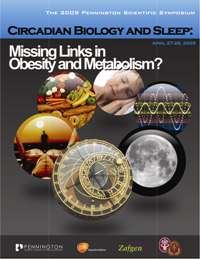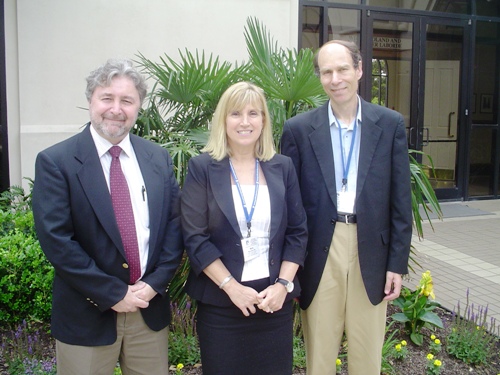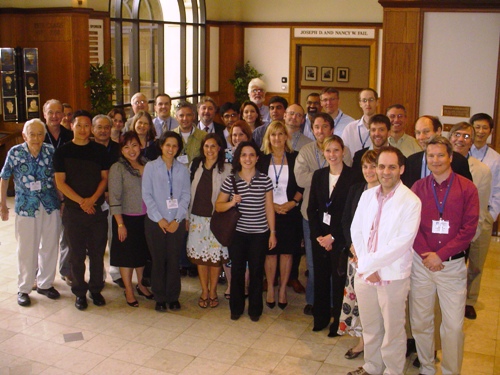Scientific Symposia Series
Circadian Biology and Sleep: Missing Links in Obesity and Metabolism?
 4/26/2009 - 4/28/2009
4/26/2009 - 4/28/2009
Co-chairs:
Jeffrey Gimble, MD., PhD.,Professor, Stem Cell Biology, Pennington Biomedical Research
Center
Molly Bray, PhD., Associate Professor of Pediatrics, Children's Nutrition Research
Center, Baylor College of Medicine
Andrew Young, Ph.D., U.S. Army Research Institute of Environmental Medicine
Program Description:
Symposium Schedule (.pdf)
There is now a growing body of evidence linking the molecular mechanisms regulating
the body’s circadian and diurnal rhythms to metabolism in health and disease. The
goal of this symposium is to develop a bridge linking the field of metabolism and
obesity research to that of circadian biology and sleep.
The data from both human and animal studies support the central theme of this symposium.
Human epidemiological studies have demonstrated that the rate of obesity in Americans
of all ages can be positively correlated to reduced levels of sleep and increased
levels of light exposure. In adult populations world-wide, disturbances of sleep and
diurnal rhythms secondary to shift work have been directly correlated to increased
risks of obesity, diabetes, hypertension, and cancer. At the basic science level,
studies of mice bearing mutations in the genes controlling the circadian clock show
evidence of
over-eating, glucose and lipid abnormalities, and obesity. While circadian genes play
a critical role in regulating the function of the murine suprachiasmatic nucleus and
central nervous system, they also control function in peripheral, metabolically active
tissues, such as adipose, liver, and skeletal muscle. Furthermore, transcriptomic
studies reveal that at least 20% of the expressed genes in each of these tissues oscillate
in a diurnal manner. Indeed, some studies indicate that the percentage could approach
100% of the transcriptome. These gene profiles can be entrained not only by the light:dark
cycle but also by the timing of food access. In disease states such as diabetes and
obesity, the expression of common circadian regulatory proteins is attenuated or impaired.
Together, these findings support a direct relationship between metabolism and circadian
mechanisms.
Although physiologists have appreciated the importance of circadian mechanisms for
centuries, the application of circadian biology to human disease and health has been
limited; however, there is reason to think this may change in the near future. With
the identification of the common circadian regulatory proteins, it is now possible
to design small molecules and other agents to modulate circadian activities. The development
of such chronotherapeutic drugs has the potential to impact disease states linked
to circadian biology, sleep, and metabolism.
This symposium will provide a diverse, multi-disciplinary platform to address this
topic. Speakers will be invited from the fields of circadian molecular biology, endocrinology,
neuroscience, nutrition, physiology, and sleep medicine to meet the following objectives:
Objectives:
1. To integrate the latest published and unpublished findings from the fields of circadian
biology, sleep, and metabolism into a cohesive framework.
2. To identify the next experimental and clinical steps necessary to translate the basic science of circadian biology to the prevention and treatment of human metabolic disease.
3. To identify opportunities for drug development targeting circadian-based therapeutics.
Background:
The Scientific Symposia Series was established in 2002 to attract world-renowned scientists
to the Pennington Biomedical Research Center , to allow them the opportunity to interact
and synthesize knowledge in selected areas of nutrition and preventive medicine research.
Scientific Symposia are coordinated by the Division of Education at the Pennington
Biomedical Research Center in conjunction with funding provided by the Pennington
Foundation and other private resources. The Pennington Biomedical Research Foundation
provides Pennington Biomedical Research Center with vital funding for this education
series as well as for nutrition-based research that aims to curb the epidemic of obesity
and prevent premature death from chronic diseases.




